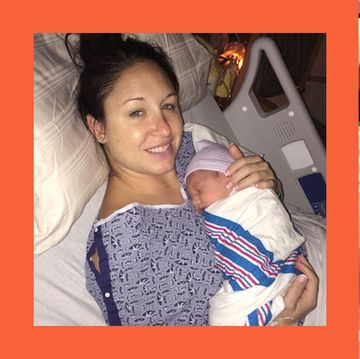- Actress Marcia Cross showed off her new wig on Instagram after losing her hair to cancer.
- Marcia, 56, revealed on Instagram that she had anal cancer, but is now cancer-free.
- Anal cancer is rare, though it has been steadily rising over the past 10 years, according to the National Cancer Institute.
Actress Marcia Cross showed off her new wig on Instagram Thursday, after revealing she had been battling cancer.
Marcia, 56, who starred in Desperate Housewives, and most recently, Quantico, shared a photo of herself in a pink beanie, with long red hair. "Thanks for all your love," she wrote. "I am rockin a #beanie and a #hairtopper and getting on with the glory of living!" Marcia added on the hashtags: #resurrection, #cancer, and #gratitude to her post. (FYI: A hair topper is more like a hair piece than a full wig.)
Her newest post is fourth in a series where Marcia revealed to her Instagram followers that she had gone through treatment for anal cancer—assuring fans that she is now cancer-free.
In her first post, she shared a photo of her hair loss from cancer: "So grateful and happy to be alive but sad that my hair fell out and is about 1 inch long now and looks cra cra," she wrote. Adding, "anyone else have #hairloss due to #cancer? Talk to me. I feel you."
That post was the first time Marcia mentioned having cancer on Instagram—and it shocked her fans. In her second post, she cleared things up, saying that she is now post-cancer. "All good now. Hard journey, but I am HEALTHY, happy, and more present and grateful than ever," she wrote. She also thanked her followers for the outpouring of love she received after her first post.
It wasn't until her third post, however, that Marcia revealed the exact cancer she was battling: anal cancer.
Hold on, tell me a little bit about anal cancer.
So, anal cancer is, essentially, cancer of the anus—the opening at the lower end of your intestines, according to the American Cancer Society (ACS). (FYI: your anus and rectum are not the same thing—waste comes out of your rectum; your anus is connected to your rectum by your anal canal).
It's rare—only about 0.5 percent of all new cancer cases are anal cancer and approximately 0.2 percent of men and women will get the diagnosis in their lifetime, according to the National Cancer Institute—though it has been steadily rising over the past 10 years.
Anal cancer doesn't always show symptoms, but when it does, it starts off as minor bleeding (many people actually dismiss this as hemorrhoids), according to the ACS. Other important symptoms of anal cancer include:
- Rectal itching
- A lump or mass at the anal opening
- Pain or a feeling of fullness in the anal area
- Narrowing of stool or other changes in bowel movements
- Abnormal discharge from the anus
- Swollen lymph nodes in the anal or groin areas
It's important to check in with your doctor if you're seeing any or all of these symptoms—especially if you see blood in your stool or regularly on the toilet paper. It's likely a benign condition (like hemorrhoids, anal fissures, or anal warts), per the ACS, but your doctor will be able to tell you exactly what's up with a digital rectal exam (DRE) or anal cytology test (a.k.a., anal Pap test, since it's similar to a typical Pap test).
Treatment for anal cancer can include surgery, radiation therapy, or chemotherapy—though, per the ACS, the best approach is a combination of radiation and chemotherapy, per the ACS.
The cause of anal cancer is unknown, though there are a few risk factors associated with it, including the human papillomavirus (HPV), a sexually transmitted disease that ups risk of the condition, according to the Centers for Disease Control and Prevention (CDC). In fact, each year about 4,300 women get a new diagnosis of HPV-related anal cancer, the CDC reports.
Other risk factors for this type of cancer include having other forms of cancer, HIV, multiple sexual partners, smoking, and lower immunity. Still, it's important to note that many people with risk factors never develop anal cancer, while others with no known risk factors may, per the ACS.
According to Marcia, though, sharing her cancer battle was freeing: “After posting a picture of myself here and uttering the words #cancer and #hairloss, I felt liberated, deliriously free and completely me," she wrote. “I am ecstatically alive and what interests me post cancer is #AUTHENTICITY, #VULNERABILITY, #TRANSPARENCY. And of course #LOVE.”













